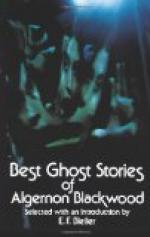“I can; but I didn’t,” continued Uncle Larry; “because my state-room was the most for’ard in the boat, and the donkey-engine that let down the anchor was right over my head.”
“So you got up and saw the sunrise over the bay,” said Dear Jones, “with the electric lights of the city twinkling in the distance, and the first faint flush of the dawn in the east just over Fort Lafayette, and the rosy tinge which spread softly upward, and——”
“Did you both come back together?” asked the Duchess.
“Because he has crossed thirty-four times you must not suppose that he has a monopoly in sunrises,” retorted Dear Jones. “No, this was my own sunrise; and a mighty pretty one it was, too.”
“I’m not matching sunrises with you,” remarked Uncle Larry, calmly; “but I’m willing to back a merry jest called forth by my sunrise against any two merry jests called forth by yours.”
“I confess reluctantly that my sunrise evoked no merry jest at all.” Dear Jones was an honest man, and would scorn to invent a merry jest on the spur of the moment.
“That’s where my sunrise has the call,” said Uncle Larry, complacently.
“What was the merry jest?” was Baby Van Rensselaer’s inquiry, the natural result of a feminine curiosity thus artistically excited.
“Well, here it is. I was standing aft, near a patriotic American and a wandering Irishman, and the patriotic American rashly declared that you couldn’t see a sunrise like that anywhere in Europe, and this gave the Irishman his chance, and he said, ’Sure ye don’t have ’em here till we’re through with ’em over there.’”
“It is true,” said Dear Jones, thoughtfully, “that they do have some things over there better than we do; for instance, umbrellas.”
“And gowns,” added the Duchess.
“And antiquities,”—this was Uncle Larry’s contribution.
“And we do have some things so much better in America!” protested Baby Van Rensselaer, as yet uncorrupted by any worship of the effete monarchies of despotic Europe. “We make lots of things a great deal nicer than you can get them in Europe—especially ice-cream.”
“And pretty girls,” added Dear Jones; but he did not look at her.
“And spooks,” remarked Uncle Larry casually.
“Spooks?” queried the Duchess.
“Spooks. I maintain the word. Ghosts, if you like that better, or specters. We turn out the best quality of spook——”
“You forget the lovely ghost stories about the Rhine, and the Black Forest,” interrupted Miss Van Rensselaer, with feminine inconsistency.
“I remember the Rhine and the Black Forest and all the other haunts of elves and fairies and hobgoblins; but for good honest spooks there is no place like home. And what differentiates our spook—Spiritus Americanus—from the ordinary ghost of literature is that it responds to the American sense of humor. Take Irving’s stories for example. The Headless Horseman, that’s a comic ghost story. And Rip Van Winkle—consider what humor, and what good-humor, there is in the telling of his meeting with the goblin crew of Hendrik Hudson’s men! A still better example of this American way of dealing with legend and mystery is the marvelous tale of the rival ghosts.”




